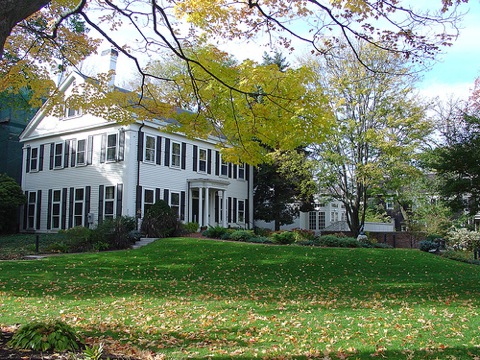
Doesn’t that look like the kind of place you’d like to spend a year?
That’s Lippmann House on the Harvard campus, where I’m lucky enough to come to work every day. It’s also the home of the Nieman Fellowships, the wonderful program that allows journalists to spend a year at Harvard, taking classes and researching the topics of their choice.
The deadline for American journalists to be part of the next class of fellows is coming up soon: January 31. (The deadline for international applicants has already passed.)
To recap, Nieman Fellows get to spend a year at Harvard, auditing whatever classes they want in any part of the university (or down the road at MIT). We pay you for the 10 months you’re here (at least $65,000, with more for fellows with children to care for). You spend the year with a couple dozen of the best journalists from around the world, your fellow fellows. The idea is to give you the chance to step away from the daily pressures of your work life and dive into the subject matters that interest you.
Some fellows use the year to focus on learning more about their beats; environmental reporters take science classes, business reporters take economics classes, and so on. Some focus on a subject far afield from what they’ve spent their careers covering, using the fellowship as a pivot point to a new career. Some use it focus on issues like those we cover here — the future of news, both financially and journalistically. (Fellows also get to spend the year working with us here at the Lab, if they choose.) It’s really up to you.
I want to give special notice to a new kind of fellowship we’re offering for the first time this year. Thanks to the generosity of the Donald W. Reynolds Foundation, we’re reserving one spot in the next class for a business journalist. So if you cover business or economics and would like to spend a year learning from smart folks like the profs at the Harvard Business School, we’d definitely like to see your application.
What kind of journalist becomes a Nieman Fellow? For many years, the class was made up primarily of newspaper reporters. But as the industry has shifted, so has the class. Our current American fellows include as many freelancers as newspaper reporters, plus people from radio, magazines, wire services, and the web. (Selfishly, I’d love to see more web folks in the next class.) Folks from television and documentary filmmaking are also very much welcome. If you do quality journalism, no matter the medium, you could be a candidate.
Anyway, the deadline is 11 days away as I write this, which is still plenty of time for you to get cracking. You can apply entirely online this year for the first time. You’ll need to submit two short essays, an application form, a few recommendations, and some samples of your work — it’s not a difficult process. So get moving, and come introduce yourself when you arrive in the fall.